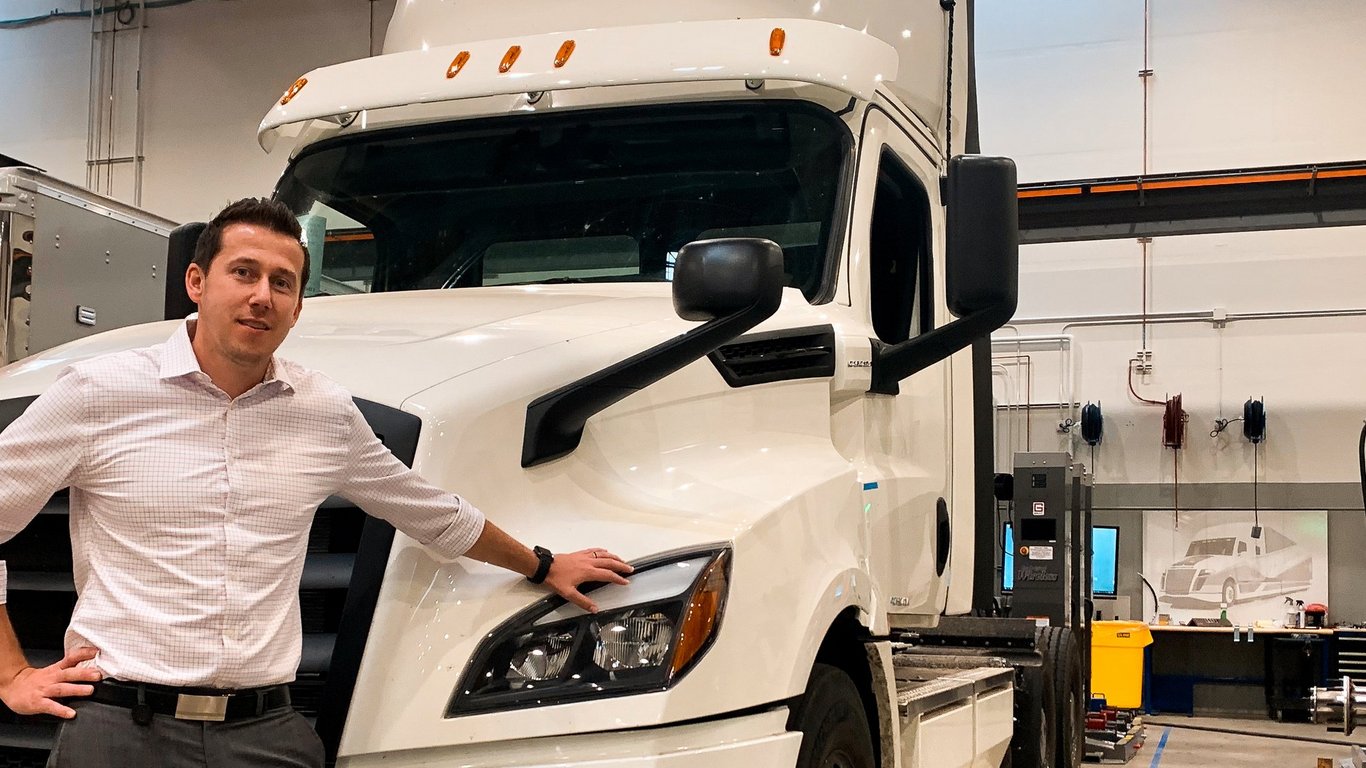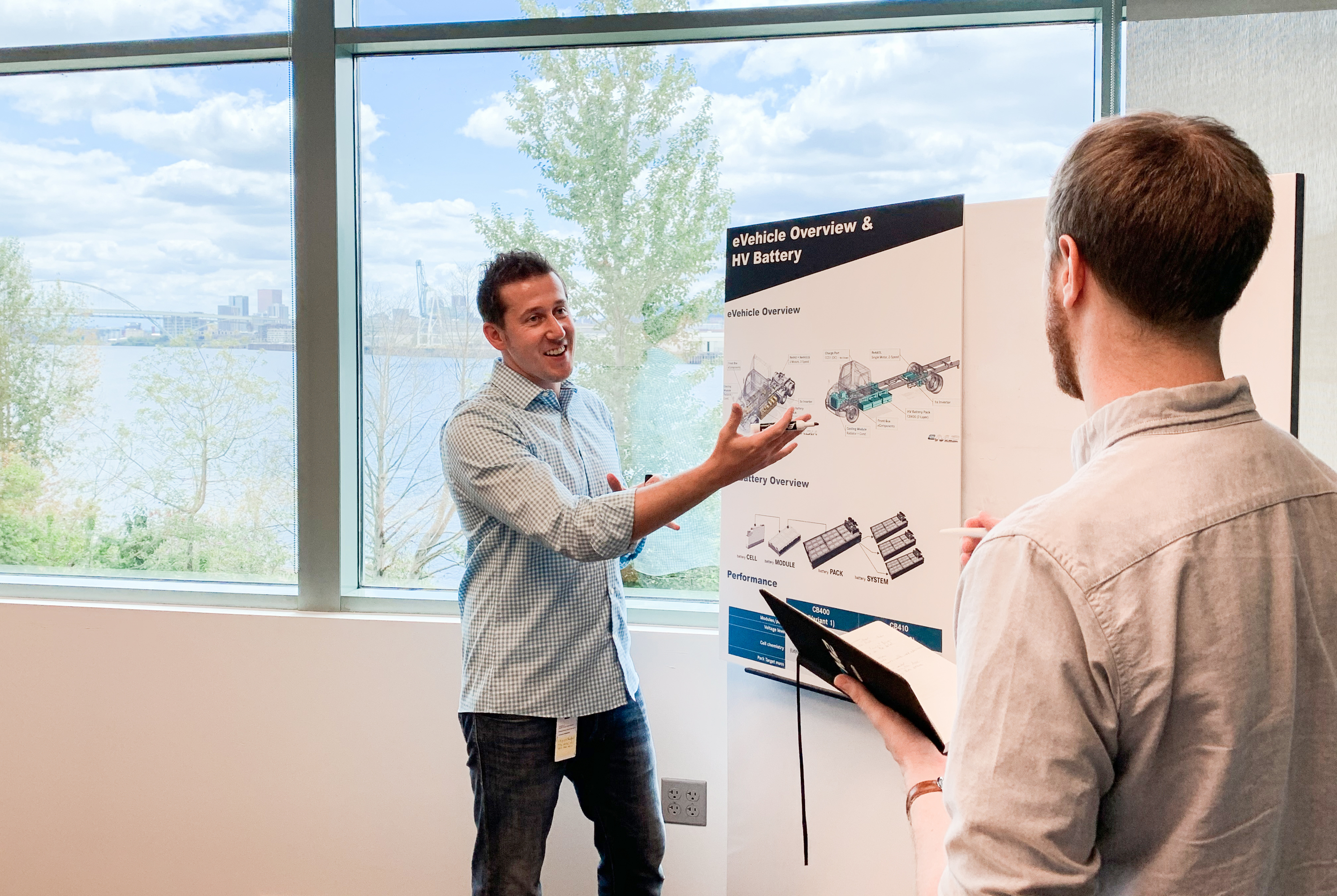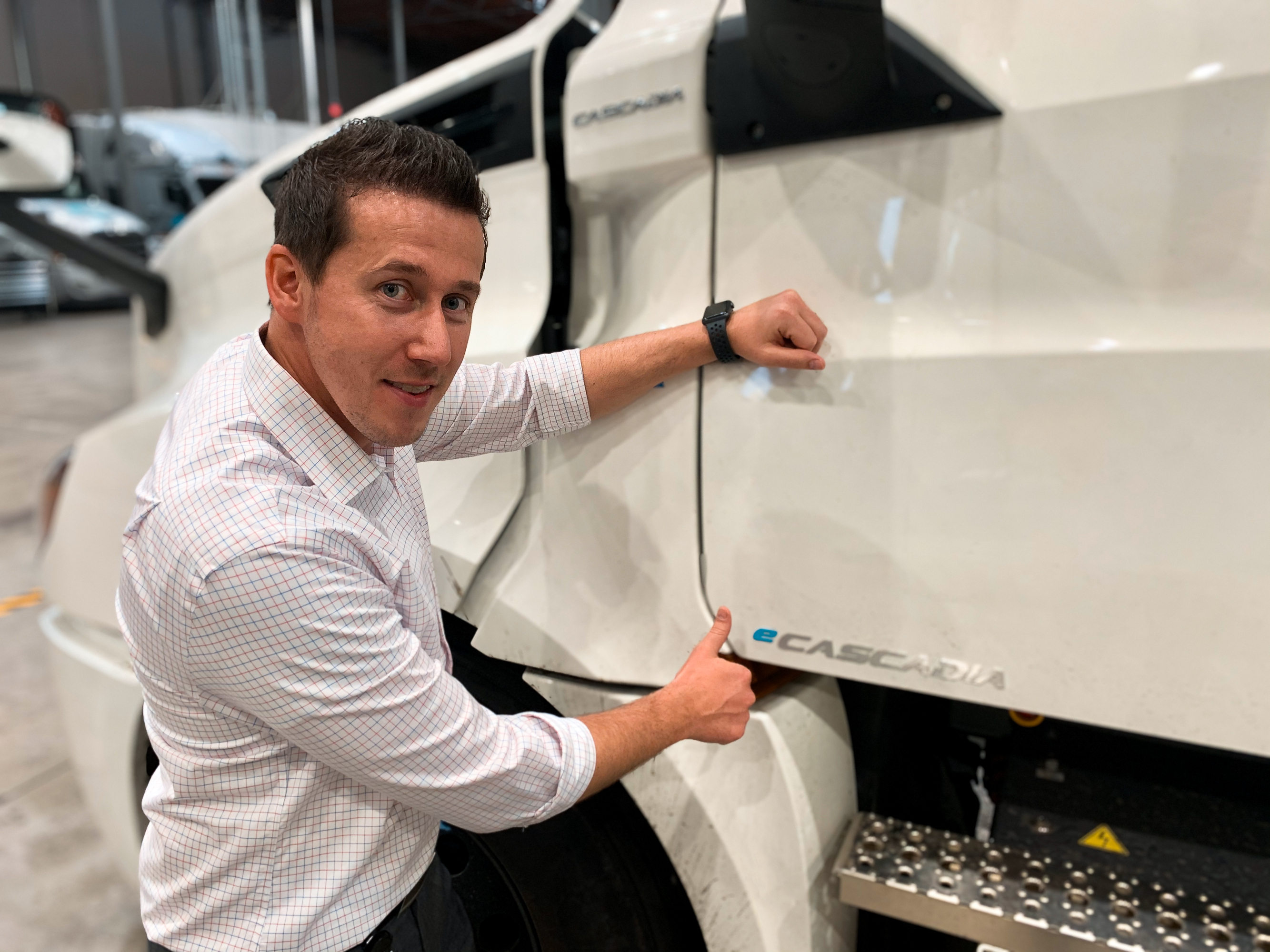Alexander Voets has one goal: to revolutionize the logistics sector in the North American market with electric trucks. Working with his team, the manager for Product Marketing & Sales Strategy Electric Trucks at Daimler Trucks North America (DTNA) in Portland, Oregon (USA) is enabling customers to experience the new technology. His projects give companies the opportunity to test the innovative and environmentally friendly commercial vehicles in their very own fleet – even before the start of series production. In this interview, the engineer reveals how the dialog with customers provides valuable ideas for the development of electric trucks, why in his opinion electric drive systems will become completely normal on our roads in the next ten years, and what makes working at Daimler Truck so unique for him.

Launching a new era with eTrucks
Marketing & Sales Electric Trucks

Mr. Voets, you are currently preparing for the introduction of electric trucks to the American market. How do you do this?
The series production of our new heavy-duty truck Freightliner eCascadia and our medium-duty truck eM2 begins in 2022. There are still a few things to be done before then. In the Sales and Marketing team, we are currently working on training our workshops and service partners so that they will have the expertise to best look after and maintain our customers' vehicles. eTrucks are not just new in the US, they are new worldwide. That is why we are also working on concepts as to how price and leasing models might look like in future. Another important task is the dialog with companies that are taking part in our Freightliner Electric Vehicle Council .
What exactly does the Council do?
In the Freightliner Electric Vehicle Council, we are working with approximately 35 of our truck customers, helping them see electric mobility as an opportunity for their fleet. In addition, we invite representatives of the companies on a bi-annual basis to discuss the challenges that arise when using eTrucks. We then work together to find possible solutions. This includes questions such as "What charging infrastructure is necessary?" and "How could cooperations promote the topic of electro-mobility?" to questions on vehicle design for certain applications and sectors. Apart from the Council, we are of course also in close contact with politics and the public. The exchange and dialog at trade fairs and events are always a highlight for me personally.
What kind of feedback do you receive on electro-mobility in these cases?
I often find that companies see eTrucks as an opportunity to make their logistics more environmentally friendly and sustainable. At the same time, there are also some reservations, as with any new technology. For example, I hear things such as: "eTrucks don't have enough power, torque or range." At the test drive, these people are then often surprised at just how powerful the drive systems are and how effortlessly the tractor units master inclines even with a full load. eTrucks offer huge benefits, which we want companies to experience with both our innovation fleets.
At the test drive of our eTrucks, people are often surprised by just how powerful the drive systems are and how effortlessly the tractor units master inclines.
With the Freightliner Customer Experience Fleet customers can test eTrucks in their own fleet. How does that work?
The fleet consists of six Freightliner eCascadia heavy-duty trucks and two medium-duty eM2 trucks. In the next two years, the electric vehicles will stop by at interested customers from different sectors for three to six months. In this way, the companies will gain a picture of how the electric trucks prove their worth in everyday business. Our second fleet, the Freightliner Electric Innovation Fleet, is already in full operation with two customers with whom we are working closely. It is designed for long-term tests and has already clocked up more than 300,000 miles in real operation.

What do you think: How will electric trucks change logistics in future?
I expect that eTrucks will become normal on our roads in the next ten years, especially in cities. On the one hand, the technology naturally harbors benefits for the companies. The higher level of investment for acquisition pays off in the long-term thanks to the reasonable operating costs. On the other hand, emission-free transport vehicles are becoming increasingly important for the image of a company because consumers rightly demand sustainability from the industry. In addition, stricter guidelines also play a role, for example on emissions.
You are very familiar with the automobile sector. How did you end up at Daimler Truck?
That's correct – actually, I have spent my entire professional career in the automobile sector, beginning with my studies, then in consulting and various jobs with automobile suppliers and manufacturers. It has always been a dream of mine to work for Daimler Truck. This of course also has to do with me coming from Germany (laughs). At the same time, the Group stands globally for quality and innovation, in particular its brand Mercedes-Benz. When I received the offer from Daimler Trucks in Portland in 2019, I didn't have to think very long about it.
Emission-free eTrucks are becoming increasingly important for companies because consumers rightly demand sustainability from the industry.

What do you really enjoy about your work?
I find it simply fascinating to work with completely new technology. Combustion engines have dominated the sector for more than 130 years. With e-mobility, I can be there at the beginning of a new era and contribute to less emissions and cleaner air in our cities. Collaboration with my team is also very special.
Can you give us an idea of what your team looks like?
I manage a team of specialists on very different topics. One of my colleagues, for example, is responsible for the sales strategy and is working on ideas regarding where we can market our eTrucks in the coming year. Another colleague looks after the area of product marketing. We complement each other perfectly and can rely on one another 100 percent – everyone is motivated and extremely solution-driven. Of course, we also work very closely with other units, for example with our product development and the colleagues who develop the preproduction series models of our trucks.
What does e-mobility look like in your personal life?
My next vehicle will definitely be an electric one. It is important for my wife and I to be part of a sustainable society – and e-mobility is simply a part of that for me.
Personal details:
Alexander Voets (36) knows the automobile sector inside out. From his degree in Automotive Engineering at the RWTH Aachen and various jobs in consulting and software design to his position as Manager Marketing & Sales Strategy Electric Trucks at Daimler Trucks North America in Portland: Alexander Voets' professional career has always been characterized by a passion for mobility. Born in Rendsburg (Germany), the engineer has chosen the US as his home for the past 10 years. Good conversation is important for Alexander Voets, and not only regarding eTrucks. He is currently learning Japanese so that in future he can talk to his wife's family.